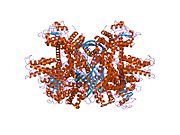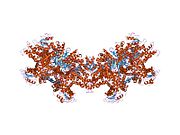GLUD2
An Error has occurred retrieving Wikidata item for infobox Glutamate dehydrogenase 2, mitochondrial, also known as GDH 2, is an enzyme that in humans is encoded by the GLUD2 gene.[1][2][3] This dehydrogenase is one of the family of glutamate dehydrogenases that are ubiquitous in life.
Function
Glutamate dehydrogenase 2 is localized to the mitochondrion and acts as a homohexamer to recycle glutamate during neurotransmission. The encoded enzyme catalyzes the reversible oxidative deamination of glutamate to alpha-ketoglutarate.[1]
References
- ^ 1.0 1.1 "Entrez Gene: glutamate dehydrogenase 2".
- ^ Shashidharan P, Michaelidis TM, Robakis NK, Kresovali A, Papamatheakis J, Plaitakis A (June 1994). "Novel human glutamate dehydrogenase expressed in neural and testicular tissues and encoded by an X-linked intronless gene". J. Biol. Chem. 269 (24): 16971–6. doi:10.1016/S0021-9258(19)89484-X. PMID 8207021.
- ^ Shashidharan P, Clarke DD, Ahmed N, Moschonas N, Plaitakis A (May 1997). "Nerve tissue-specific human glutamate dehydrogenase that is thermolabile and highly regulated by ADP". J. Neurochem. 68 (5): 1804–11. doi:10.1046/j.1471-4159.1997.68051804.x. PMID 9109504. S2CID 83848260.
Further reading
- Ross MT, Grafham DV, Coffey AJ, et al. (2005). "The DNA sequence of the human X chromosome". Nature. 434 (7031): 325–37. Bibcode:2005Natur.434..325R. doi:10.1038/nature03440. PMC 2665286. PMID 15772651.
- Need AC, Keefe RS, Ge D, et al. (2009). "Pharmacogenetics of antipsychotic response in the CATIE trial: a candidate gene analysis". Eur. J. Hum. Genet. 17 (7): 946–57. doi:10.1038/ejhg.2008.264. PMC 2986499. PMID 19156168.
- Stelzl U, Worm U, Lalowski M, et al. (2005). "A human protein-protein interaction network: a resource for annotating the proteome". Cell. 122 (6): 957–68. doi:10.1016/j.cell.2005.08.029. hdl:11858/00-001M-0000-0010-8592-0. PMID 16169070. S2CID 8235923.
- Burki F, Kaessmann H (2004). "Birth and adaptive evolution of a hominoid gene that supports high neurotransmitter flux". Nat. Genet. 36 (10): 1061–3. doi:10.1038/ng1431. PMID 15378063.
- Plaitakis A, Latsoudis H, Kanavouras K, et al. (2010). "Gain-of-function variant in GLUD2 glutamate dehydrogenase modifies Parkinson's disease onset". Eur. J. Hum. Genet. 18 (3): 336–41. doi:10.1038/ejhg.2009.179. PMC 2987208. PMID 19826450.
- Yang SJ, Cho EH, Choi MM, et al. (2005). "Critical role of the cysteine 323 residue in the catalytic activity of human glutamate dehydrogenase isozymes". Mol. Cells. 19 (1): 97–103. doi:10.1016/S1016-8478(23)13142-6. PMID 15750346.
- Yang SJ, Huh JW, Hong HN, et al. (2004). "Important role of Ser443 in different thermal stability of human glutamate dehydrogenase isozymes". FEBS Lett. 562 (1–3): 59–64. doi:10.1016/S0014-5793(04)00183-8. PMID 15044002.
- Kanavouras K, Borompokas N, Latsoudis H, et al. (2009). "Mutations in human GLUD2 glutamate dehydrogenase affecting basal activity and regulation". J. Neurochem. 109 (Suppl 1): 167–73. doi:10.1111/j.1471-4159.2009.05914.x. PMID 19393024.
- Mastorodemos V, Zaganas I, Spanaki C, et al. (2005). "Molecular basis of human glutamate dehydrogenase regulation under changing energy demands". J. Neurosci. Res. 79 (1–2): 65–73. doi:10.1002/jnr.20353. PMID 15578726. S2CID 24840962.
- Smith TJ, Schmidt T, Fang J, et al. (2002). "The structure of apo human glutamate dehydrogenase details subunit communication and allostery". J. Mol. Biol. 318 (3): 765–77. doi:10.1016/S0022-2836(02)00161-4. PMID 12054821.
- Plaitakis A, Spanaki C, Mastorodemos V, Zaganas I (2003). "Study of structure-function relationships in human glutamate dehydrogenases reveals novel molecular mechanisms for the regulation of the nerve tissue-specific (GLUD2) isoenzyme". Neurochem. Int. 43 (4–5): 401–10. doi:10.1016/S0197-0186(03)00028-7. PMID 12742085. S2CID 21332852.
- Mastorodemos V, Kotzamani D, Zaganas I, et al. (2009). "Human GLUD1 and GLUD2 glutamate dehydrogenase localize to mitochondria and endoplasmic reticulum". Biochem. Cell Biol. 87 (3): 505–16. doi:10.1139/o09-008. PMID 19448744.
- Spanaki C, Zaganas I, Kleopa KA, Plaitakis A (2010). "Human GLUD2 glutamate dehydrogenase is expressed in neural and testicular supporting cells". J. Biol. Chem. 285 (22): 16748–56. doi:10.1074/jbc.M109.092999. PMC 2878061. PMID 20194501.
- Ahmed M, Forsberg J, Bergsten P (2005). "Protein profiling of human pancreatic islets by two-dimensional gel electrophoresis and mass spectrometry". J. Proteome Res. 4 (3): 931–40. doi:10.1021/pr050024a. PMID 15952740.
- Rosso L, Marques AC, Reichert AS, Kaessmann H (2008). "Mitochondrial targeting adaptation of the hominoid-specific glutamate dehydrogenase driven by positive Darwinian selection". PLOS Genet. 4 (8): e1000150. doi:10.1371/journal.pgen.1000150. PMC 2478720. PMID 18688271.
- Gerhard DS, Wagner L, Feingold EA, et al. (2004). "The status, quality, and expansion of the NIH full-length cDNA project: the Mammalian Gene Collection (MGC)". Genome Res. 14 (10B): 2121–7. doi:10.1101/gr.2596504. PMC 528928. PMID 15489334.
- Zaganas I, Kanavouras K, Mastorodemos V, et al. (2009). "The human GLUD2 glutamate dehydrogenase: localization and functional aspects". Neurochem. Int. 55 (1–3): 52–63. doi:10.1016/j.neuint.2009.03.001. PMID 19428807. S2CID 40181114.
- Strausberg RL, Feingold EA, Grouse LH, et al. (2002). "Generation and initial analysis of more than 15,000 full-length human and mouse cDNA sequences". Proc. Natl. Acad. Sci. U.S.A. 99 (26): 16899–903. Bibcode:2002PNAS...9916899M. doi:10.1073/pnas.242603899. PMC 139241. PMID 12477932.
- Kanavouras K, Mastorodemos V, Borompokas N, et al. (2007). "Properties and molecular evolution of human GLUD2 (neural and testicular tissue-specific) glutamate dehydrogenase". J. Neurosci. Res. 85 (15): 3398–406. doi:10.1002/jnr.21576. PMID 17924438. S2CID 30673608.
Lua error in mw.title.lua at line 346: bad argument #2 to 'title.new' (unrecognized namespace name 'Portal').






